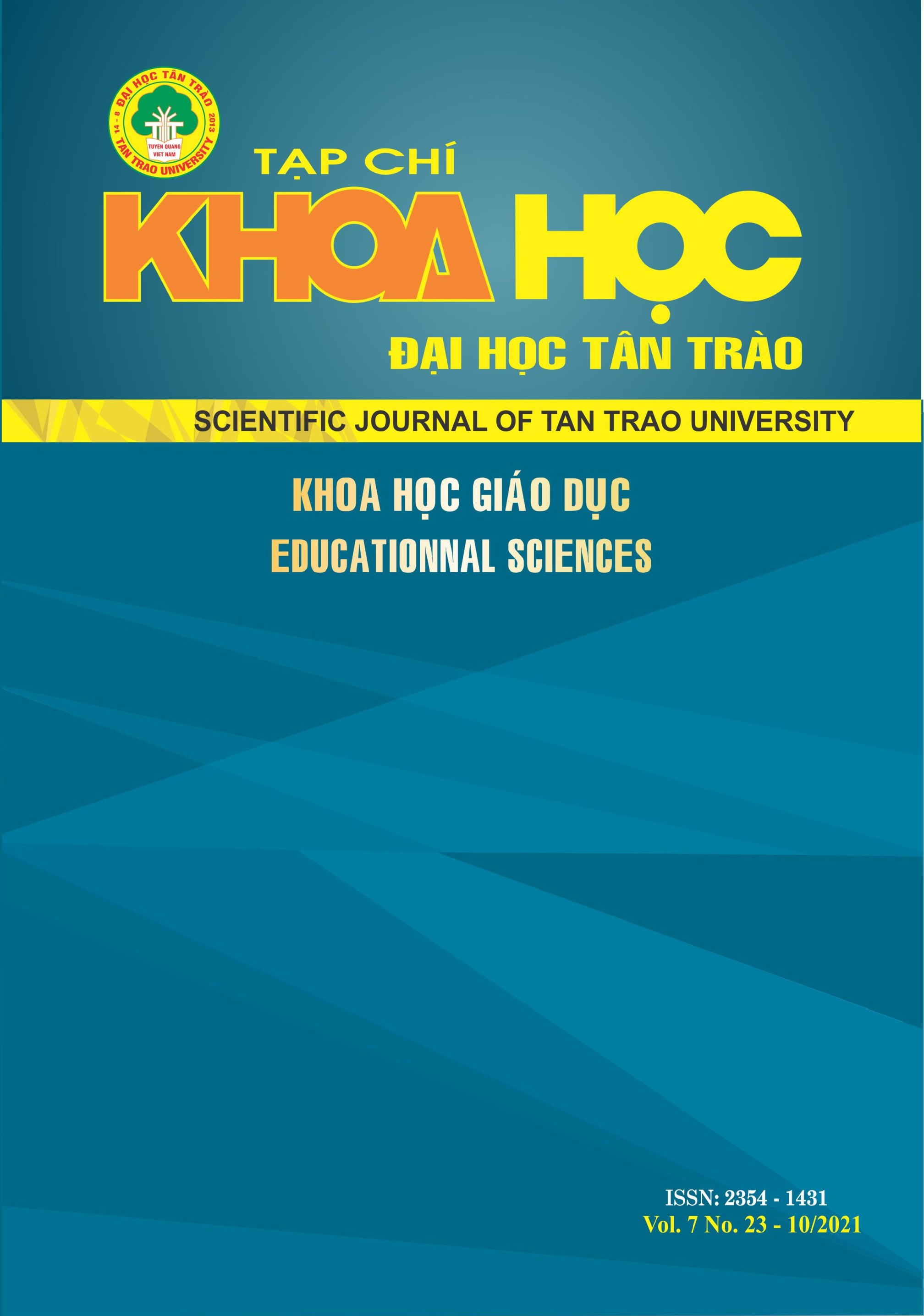OVERVIEW OF RESEARCHES ON ENGLISH TEACHING AND LEARNING: ENGLISH FOR SPECIFIC PURPOSES
DOI:
https://doi.org/10.51453/2354-1431/2021/601Keywords:
researches, ESP, teaching and learning ESP, lingua franca, scholarsAbstract
The increasing demand of English for Specific Purposes (ESP) has resulted in the need for a lingua franca of science, technology, education, and business. The field of ESP has promptly flourished recently to play an important part in English language teaching and research. Accordingly, the desires to master technical terms to meet job requirements force people to know ESP rather than basic English for daily communication. Researches on teaching and learning ESP have been conducted widely not only in Vietnam but other countries by high prestigious scholars and knowledgeable researchers with the main purpose to figure out the most effective approaches, which enables educators, teachers and learners as well to adapt the best teaching methods to accomplish their wishes. Based on material research methodology, an overview of studies on teaching and learning ESP both inside and outside Vietnam, as well as background knowledge on ESP teaching and learning, the researcher indicates the challenges, opportunities and benefits brought to teachers and learners in ESP training.
Downloads
References
[1] Hyland, K. (2006). English for Academic Purposes: An Advanced Resource Book. London, UK: Routledge.
[2] Strevens, P. (1988). ESP after twenty years: A re-appraisal. In M. Tickoo (Ed.): State of the art (p. 1-13). Singapore, SG: SEAMEO Regional Centre.
[3] Robinson, P. (1991). ESP today: A practitioner’s guide. New York, US: Prentice Hall International.
[4] Hutchinson, T., Waters, A. (1987). English for Specific Purposes: A Learning-centred Approach. Cambridge University Press. https://doi.org/10.1017/ CBO9780511733031.
[5] Dudley-Evans, T., & John, M. J. (1998). Developments in English for Specific Purposes: A multi-disciplinary Approach. Cambridge, UK: Cambridge University Press.
[6] Jordan, R. R. (1997) English for Academic Purposes: A Guide and Resource Book for Teachers. Cambridge: Cambridge University Press.
[7] Harmer, J. (1991). The practice of English language Teaching. London Longman.
[8] Widdowson, H. G. (1990). English for Specific Purposes: Criteria for course design. In Selinker et al. (eds). English for Academic and Technical Purposes: Studies in Honour of Louis Trimble. Rowley. Mass: Newbury House.
[9] Basturkmen, H. (2010). Developing Courses for Professional Purposes. New York: Pelgrave Macmillan
[10] Dong, Q. L. (2010). English Language for Specific Purpose Teaching – Some Problems on Teaching Syllabus. Language & Life magazine, 11(193), 27-32. https://vjol.info.vn/index.php/NNDS/article/view/15840/14239
[11] Ha, T. T. (2019). Theoretical Framework for English Language for Specific Purpose Syllabus Building for Students Majoring in Graphic Design at National University of Arts Education. Journal of education, 2(446): 53-58.
https://tapchigiaoduc.moet.gov.vn/vi/magazine/download/?download=1&catid=399&id=7056
[12] Phuong, L. D. (2017). Theoretical Models for Syllabus Assessment at Language Institution at Hanoi University of Science and Technology. Journal of Education. Special Vol. 4: 102-105. https://tapchigiaoduc.moet.gov.vn/vi/magazine/download/?download=1&catid=268&id=4066
[13]. Tsou, W., Chen, F. (2014). ESP program evaluation framework: Description and application to a Taiwanese university ESP program. English for Specific Purposes, 33: 39-53.
https://doi.org/10.1016/j.esp.2013.07.008
[14] Dung, T. X. D., Anh, N. D. C. (2010). Teaching and Learning English Language for Specific Purposes in Current Circumstances: Challenges and Solutions. Hue University Journal of Science, 60: 31-41.
https://hueuni.edu.vn/portal/data/doc/tapchi/60_4.pdf
[15] Binh, C. H. (2016). Teaching and Learning English Language for Specific Purposes in Setting of Intergration and Globalization. Nha Trang University Conference Proceedings. Nov.2016.
[16] Khanh, T. M. T. (2016). Collaboration between Teachers of English Language for Specific Purposes and Teachers of Specialization – A Soluton to enhance English Language for Specific Purpose Teaching. Nha Trang University Conference Proceedings. 32-38.
[17] Thuan, D. N., Long, T. V. (2016). A Solution to Enhance English Language for Specific Purpose Ability for Students at Nha Trang University. Nha Trang University Conference Proceedings.
[18] Hong, T. L. (2016). Employing Tasks in TOEFL in Building a System of Multiple Choice Questions in English for Information and Technology. Journal of Education. Special Vol. 4/2016, 132-135.
https://tapchigiaoduc.moet.gov.vn/vi/magazine/download/?download=1&catid=252&id=3376
[19] Nijolė, N. (2006). Teaching English for Specific Purposes. Journal Coactivity: Philology, Educology, 14(4): 80-82.
https://doi.org/10.3846/coactivity.2006.47
[20] Pleșca. G. (2016). The Essence of English for Specific Purposes.
https://www.researchgate.net/publication/323254539_The_Essence_of_English_for_Specific_Purposes.
[21] Fitria, T. N. (2020). Teaching English for Specific Purposes (ESP) to the Students in English Language Teaching (ELT). Journal of English Teaching, 5(1): 55-66.
https://doi.org/10.36456/jet.v5.n01.2020.2276
[22] Northcott, J. (2009). Teaching legal English: Context and cases. In D. Belcher (Ed.), English for specific purposes: Theory and practice (165–185). Ann Arbor, MI: University of Michigan Press.
[23] Luczak. A. (2009). Legal English Courses at Universities by Non-Lawyer Teachers: Towards the Model of Educating Legal English Teachers in Poland. International Journal of Arts and Science. 5(18), 186-197. CD-ROM.ISSN:1944-6934.
Downloads
Published
How to Cite
Issue
Section
License

This work is licensed under a Creative Commons Attribution-ShareAlike 4.0 International License.
All articles published in SJTTU are licensed under a Creative Commons Attribution-ShareAlike 4.0 International (CC BY-SA) license. This means anyone is free to copy, transform, or redistribute articles for any lawful purpose in any medium, provided they give appropriate attribution to the original author(s) and SJTTU, link to the license, indicate if changes were made, and redistribute any derivative work under the same license.
Copyright on articles is retained by the respective author(s), without restrictions. A non-exclusive license is granted to SJTTU to publish the article and identify itself as its original publisher, along with the commercial right to include the article in a hardcopy issue for sale to libraries and individuals.
Although the conditions of the CC BY-SA license don't apply to authors (as the copyright holder of your article, you have no restrictions on your rights), by submitting to SJTTU, authors recognize the rights of readers, and must grant any third party the right to use their article to the extent provided by the license.


